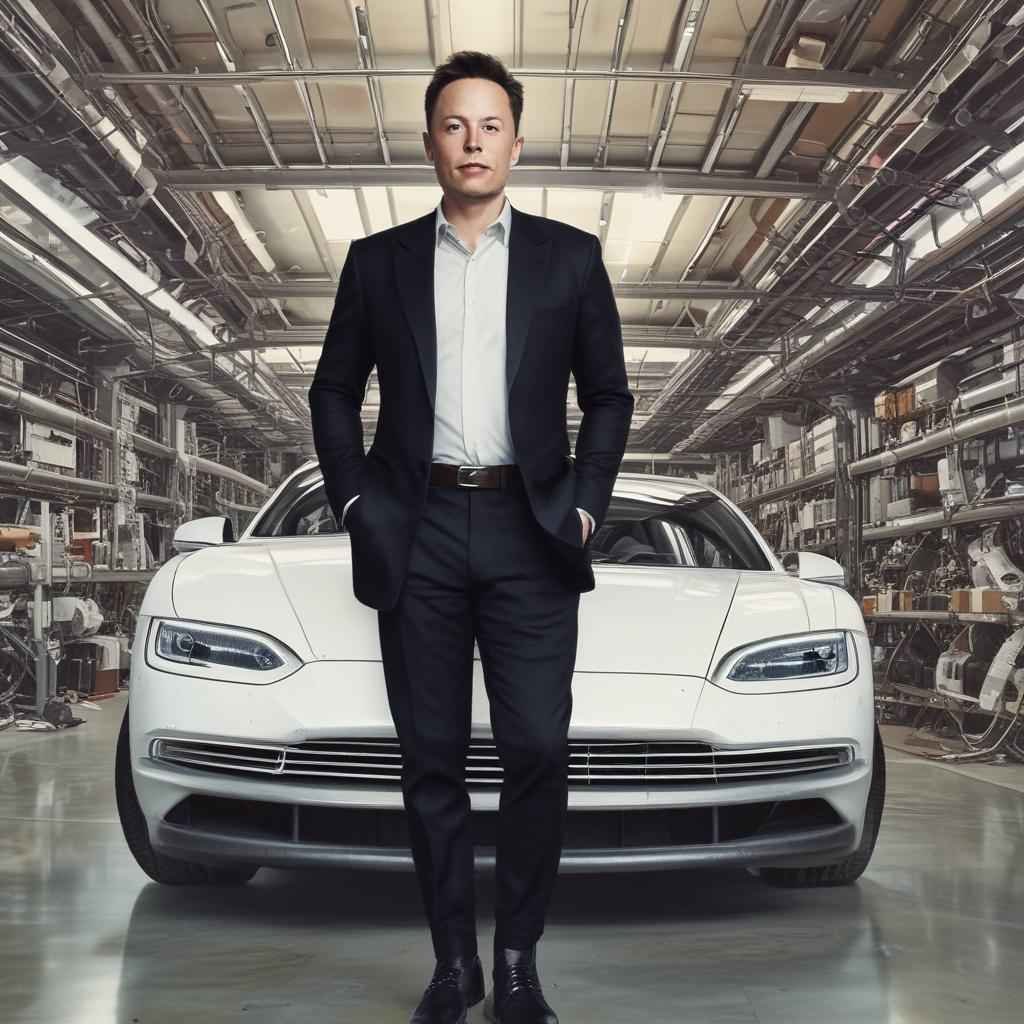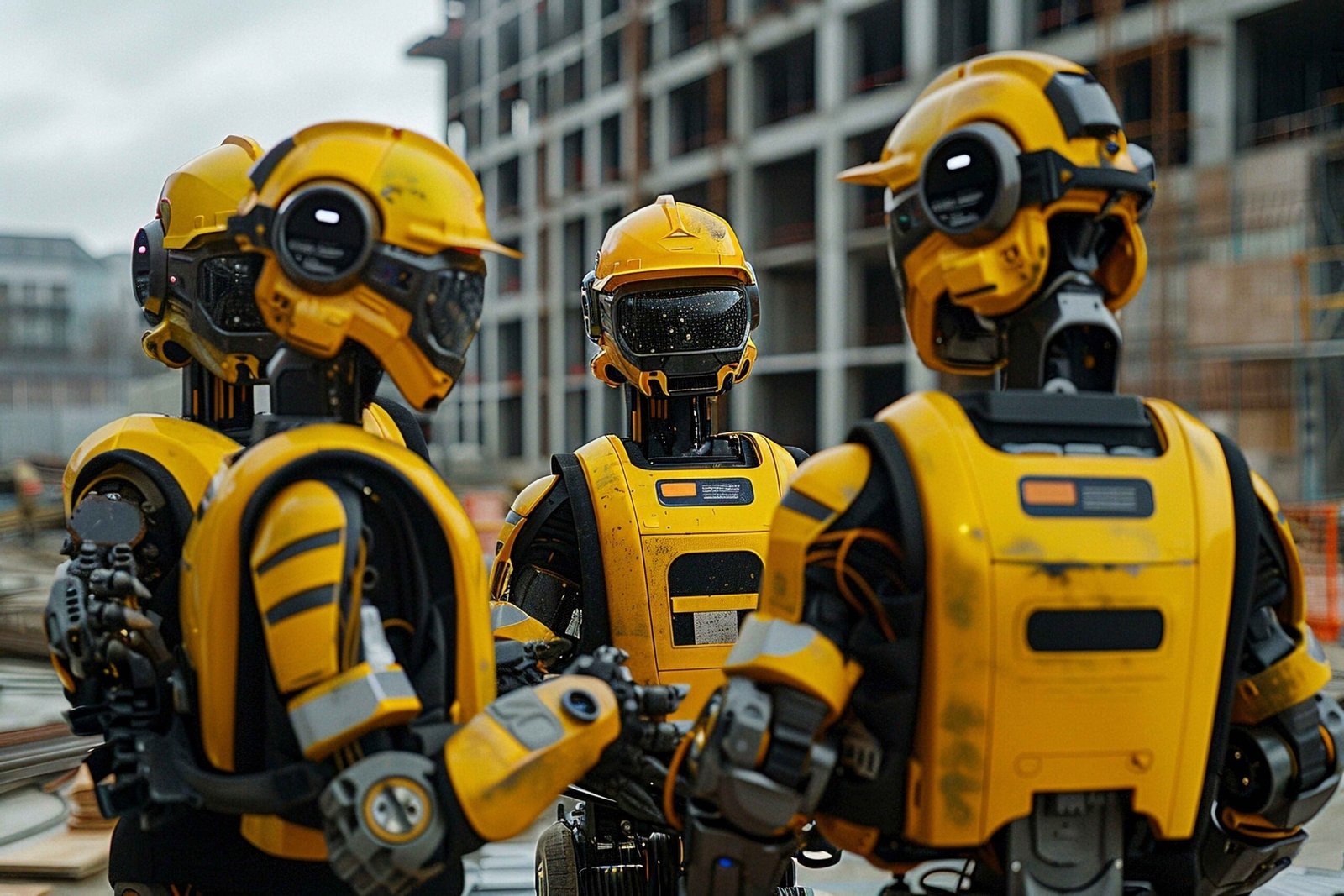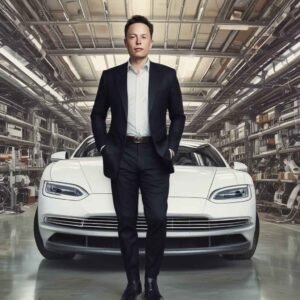
The world is rapidly evolving, with technology pushing the boundaries of what we once believed was possible. Among the key figures driving this change is Elon Musk, a name synonymous with innovation, groundbreaking ventures, and futuristic ideas. From electric cars to space exploration, Musk’s vision for the future has always been bold. However, the next phase of his journey is centered around something even more profound: artificial intelligence (AI), and more specifically, Artificial General Intelligence (AGI). This article explores the future of Musk’s plans, the trajectory of AI by 2025, and how these developments will shape new job opportunities for people worldwide.
1. Elon Musk’s AI Vision: A Glimpse Into the Future
Elon Musk’s interest in AI is no secret. His company, OpenAI, is at the forefront of developing safe and beneficial artificial intelligence. Musk has often expressed concerns about the potential risks of AI, but he believes in harnessing it for good. His future plans involve pushing the boundaries of AI, with an ambitious aim to create AGI — a form of AI that could perform any intellectual task that a human can do, and perhaps even surpass human intelligence.
The road to AGI is filled with challenges, but Musk is not one to shy away from them. His long-term vision includes developing AI systems that work alongside humans, enhancing productivity while addressing some of the most pressing issues facing humanity today, such as climate change and healthcare.
2. What is AGI and Why Does It Matter?
AGI, or Artificial General Intelligence, represents the holy grail of AI research. Unlike narrow AI, which is designed to perform specific tasks (like virtual assistants or facial recognition), AGI aims to possess generalized intelligence, meaning it can learn, adapt, and reason in the same way a human does.
The potential applications of AGI are limitless:
- Medical advancements: AGI could revolutionize healthcare by diagnosing diseases faster and more accurately than any human doctor.
- Environmental solutions: From climate modeling to creating sustainable energy solutions, AGI could help tackle the world’s biggest environmental problems.
- Economic impact: AGI could enhance productivity across industries, but it also raises questions about job displacement and the future workforce.
By 2025, we may not see a fully realized AGI, but we are likely to witness significant strides towards this goal. Musk’s companies, such as OpenAI and Tesla, are already experimenting with advanced machine learning models that could serve as building blocks for AGI.
3. AI and the Job Market: What Will Change by 2025?
One of the biggest concerns surrounding AI is its impact on jobs. As AI systems become more advanced, certain industries will undergo major transformations, leading to the rise of new job roles while others may become obsolete. Here’s a look at some industries and jobs that are expected to emerge or transform by 2025:

a. AI and Automation Specialists
With the increased integration of AI into various sectors, there will be a high demand for professionals who can develop, manage, and optimize AI systems. These specialists will be responsible for ensuring AI algorithms function efficiently and ethically. As more businesses adopt AI-driven processes, roles in AI development, machine learning engineering, and automation will see massive growth.
b. Robotics Engineers
As AI drives the creation of more intelligent robots, industries such as manufacturing, healthcare, and agriculture will require a new generation of robotics engineers. These professionals will design and build robots capable of performing complex tasks autonomously, revolutionizing production lines, surgeries, and even food harvesting.
c. Data Scientists and Analysts
The rise of AI means more data than ever before will need to be collected, processed, and analyzed. Data scientists and analysts will play a crucial role in interpreting this data, making sense of it, and applying it to real-world problems. In fact, data science has already become one of the hottest job markets, and by 2025, it will only grow in importance.
d. AI Ethics Officers
As AI becomes more ingrained in society, ethical concerns will arise, including issues related to privacy, bias, and decision-making transparency. AI ethics officers will ensure that AI systems are designed and implemented in a way that aligns with ethical guidelines and societal norms.
4. The Skills You Need to Succeed in the AI-Driven Job Market
As the demand for AI-related jobs increases, there’s a clear need for individuals to adapt and acquire new skills. By 2025, certain skills will be indispensable in the job market. Here’s what you should focus on:
a. Programming and Coding
Understanding programming languages like Python, R, and Java will be essential for those looking to work in AI and related fields. These languages are the backbone of machine learning models, algorithms, and data processing tools.
b. Data Literacy
Being able to interpret and analyze data is no longer just for data scientists. Across all industries, employees will need to have a solid grasp of data literacy to make informed decisions based on AI-generated insights.
c. Creative Problem-Solving
While AI can handle data and automation, creativity remains uniquely human. By honing creative problem-solving skills, individuals can complement AI’s abilities and remain an essential part of the workforce.
d. Emotional Intelligence
AI might excel at logic and reasoning, but it struggles with emotional intelligence (EQ). Jobs that involve human interaction, negotiation, and empathy will continue to thrive, making EQ a valuable asset in the workplace.
5. Musk’s AI Future: Concerns and Ethical Challenges
While the potential of AI is immense, there are also legitimate concerns. Musk himself has often spoken about the dangers of unchecked AI development. The primary concern revolves around AI autonomy — the idea that AI systems could become too powerful and difficult to control.
a. Job Displacement
One of the biggest fears is job displacement. As automation and AI take over repetitive and data-driven tasks, millions of workers may find their roles redundant. Musk has suggested that governments may need to implement Universal Basic Income (UBI) to counter the economic effects of widespread job loss.
b. AI Bias and Ethics
Another challenge lies in the biases that AI systems can inherit from their developers or the data they’re trained on. This raises ethical concerns about fairness, especially in sensitive areas such as hiring, law enforcement, and healthcare.
c. Autonomous Weapons
Musk has also warned about the dangers of AI being used to develop autonomous weapons. These AI-powered systems could make life-or-death decisions without human oversight, raising serious moral and security concerns.
6. Looking Ahead: How to Prepare for the Future of AI
To thrive in a future dominated by AI, individuals, businesses, and governments must start preparing now. Here’s how:
a. Continuous Learning
In an AI-driven world, learning never stops. Individuals must stay ahead by continually upgrading their skills through online courses, certifications, and hands-on projects.
b. Embracing Technology
Businesses should invest in AI and automation tools that can streamline operations and improve efficiency. Those who resist technological change risk falling behind their competitors.
c. Government Support
Governments should implement policies that promote AI research and development while addressing potential risks like job displacement and AI ethics. Initiatives such as reskilling programs and UBI could help mitigate some of the negative effects of AI adoption.
Conclusion: The Future is Here, Are You Ready?
Elon Musk’s plans for AI and AGI are not just science fiction; they are real, and they are coming fast. By 2025, we’ll witness tremendous advancements in AI technology, reshaping industries, creating new job opportunities, and even presenting new challenges. For individuals and businesses alike, the key to success in this new era will be adaptability, lifelong learning, and an open mind.
1. Elon Musk’s AI Vision: Driving Humanity Towards AGI
Elon Musk’s engagement with AI has long been a central part of his strategic planning. His primary focus is to ensure AI is used safely and beneficially for humanity. While most of Musk’s current work is centered around electric vehicles (Tesla) and space travel (SpaceX), his investment in AI—through companies like OpenAI and Neuralink—demonstrates his belief in the transformative power of this technology.
a. OpenAI and Musk’s Mission
OpenAI, a company Musk helped co-found, has the explicit mission of creating and advancing artificial intelligence in a way that is safe for humanity. Unlike traditional AI, which is narrowly focused on specific tasks, OpenAI aims to develop AGI—an intelligence that could potentially understand and learn any task as efficiently as a human. This level of AI would not just perform isolated tasks but could fully comprehend, reason, and make decisions across a wide range of disciplines.
b. Neuralink and the Human-AI Interface
Another key component of Musk’s AI vision is Neuralink, a company dedicated to bridging the gap between human cognition and AI through brain-computer interfaces (BCIs). While the ultimate goal of Neuralink is to treat brain-related medical conditions, Musk envisions a future where BCIs enable humans to merge with AI. This “symbiosis” with AI, according to Musk, will allow humans to keep pace with the rapidly advancing capabilities of AGI.
Through these initiatives, Musk is pushing the boundaries of what’s possible with AI, ensuring humanity doesn’t just co-exist with intelligent machines, but thrives in a future shaped by them.
2. Understanding AGI: The Game Changer for 2025 and Beyond
While narrow AI is already part of our daily lives—think of virtual assistants like Siri or Google Assistant—AGI is a much more profound advancement. AGI refers to an intelligence that can reason, learn, and apply knowledge across a wide variety of tasks, essentially possessing the same intellectual capabilities as a human.
a. How AGI Differs from Narrow AI
Current AI systems, while impressive, are task-specific. They can drive cars, recognize faces, or translate languages, but they lack the ability to generalize their knowledge across different areas. AGI, on the other hand, would be capable of learning any task or discipline with minimal human intervention.
For instance, where current AI might excel in analyzing medical images to detect disease, AGI could simultaneously learn to diagnose multiple health conditions, design new medical treatments, and even collaborate with doctors in real-time during surgery. The potential impact of AGI could span multiple sectors, including:
- Healthcare: AGI could radically change medical diagnostics, drug discovery, and personalized treatments, revolutionizing global healthcare.
- Energy: By optimizing renewable energy systems and finding new sustainable methods, AGI could significantly contribute to combating climate change.
- Economics: AGI could automate complex economic models, help predict market trends, and streamline global trade.
b. Timelines and Expectations for AGI by 2025
While Musk is optimistic about AGI’s development, he has also acknowledged that building AGI will take time and extreme caution. By 2025, we are likely to see major strides in narrow AI capabilities, particularly in industries like healthcare, robotics, and autonomous systems. However, a fully operational AGI that matches or surpasses human intelligence could still be a decade or more away.
3. AI and the Future of Work: New Job Opportunities and Changes by 2025
One of the most significant impacts AI will have on the world is the transformation of the job market. By 2025, AI will have reshaped industries from manufacturing to finance, creating new jobs while making certain roles obsolete. Here are the key areas where we expect to see change:
a. Automation and the Shift in Employment
Automation, powered by AI, will play a central role in changing the future of work. Routine jobs in sectors like manufacturing, transportation, and logistics are likely to be replaced by robots and intelligent systems. This shift could lead to job displacement for millions, but at the same time, new jobs will emerge, particularly in the tech and AI sectors.
New Job Roles Expected to Emerge:
- AI Developers and Engineers: As more businesses implement AI, the need for experts who can design, develop, and maintain AI systems will skyrocket.
- Data Analysts and Scientists: With vast amounts of data generated by AI systems, professionals capable of interpreting and making sense of this data will be in high demand.
- Ethical AI Consultants: As AI systems become more autonomous, ethical issues will arise, creating the need for professionals who specialize in ensuring that AI operates within ethical guidelines.
- Cybersecurity Experts: AI’s increasing presence will also demand stronger cybersecurity to protect AI-driven systems from breaches and attacks.
b. Industries That Will See Major AI Disruptions
AI will not just create new jobs; it will transform entire industries. Here’s how AI is expected to disrupt key sectors by 2025:
- Healthcare: AI will revolutionize diagnostics, treatment planning, and patient care. Medical professionals will collaborate with AI systems to provide personalized care.
- Finance: Automated trading systems, AI-driven risk management tools, and robo-advisors will transform how we manage money and investments.
- Retail: AI will drive customer personalization, improve inventory management, and automate logistics, changing the way goods are produced and delivered.
- Education: AI could personalize learning experiences, helping educators cater to individual students’ needs while automating administrative tasks.
4. Preparing for the AI-Driven Job Market: The Skills You’ll Need by 2025
As AI continues to shape the workforce, certain skills will become indispensable for individuals looking to thrive in this new landscape. Here’s what you should focus on developing:

a. Technical Skills: Coding and Machine Learning
Programming languages like Python, R, and JavaScript will be essential for anyone looking to work with AI systems. Machine learning, in particular, will be at the core of AI innovation, making knowledge of data modeling, algorithm development, and neural networks crucial.
b. Data Science and Analysis
Data is the lifeblood of AI, and data scientists who can collect, process, and analyze large datasets will remain in high demand. Beyond simply crunching numbers, data analysts will be tasked with interpreting results and making strategic recommendations based on AI insights.
c. Soft Skills: Critical Thinking and Emotional Intelligence
While AI excels at processing data and automating tasks, it still lacks emotional intelligence and creativity. As a result, jobs that require human interaction, negotiation, and critical thinking will continue to flourish. Emotional intelligence (EQ), in particular, will be highly valued in leadership roles.
d. AI Ethics and Social Responsibility
Given the ethical concerns surrounding AI, professionals who can address issues like bias, privacy, and decision transparency will be key players in ensuring AI benefits society as a whole.
5. Challenges and Ethical Concerns in Elon Musk’s AI Vision
While the future of AI promises immense benefits, it also comes with significant ethical and social challenges. Musk has been vocal about the dangers of AI, particularly the risk of creating a superintelligent AI that could surpass human control.
a. Job Displacement and Economic Inequality
One of the most pressing concerns is the potential for AI to displace millions of workers, particularly in low-skill jobs. Musk has suggested that governments may need to implement Universal Basic Income (UBI) to provide financial security for those affected by job automation. However, retraining and reskilling programs could help transition displaced workers into new, AI-centric roles.
b. AI Bias and Fairness
AI systems, particularly those based on machine learning, are only as good as the data they are trained on. If that data is biased, the AI can perpetuate unfairness in areas like hiring, lending, and law enforcement. Addressing bias in AI is crucial to ensure that these systems serve all of humanity equally.
c. Autonomous Weapons and Security Threats
Musk has also raised concerns about AI’s potential use in warfare. Autonomous weapons, powered by AI, could make life-or-death decisions without human intervention, posing serious ethical and security risks. This has led Musk to advocate for global regulations to prevent AI from being used for harmful purposes.
6. The Road Ahead: How to Thrive in an AI-Dominated Future
The future of AI is inevitable, but how individuals, businesses, and governments respond to it will determine whether it leads to widespread prosperity or societal disruption.
a. Continuous Learning and Adaptation
In the AI-driven world of 2025 and beyond, adaptability will be key. Workers must commit to lifelong learning, acquiring new skills, and staying up-to-date with technological advancements.






